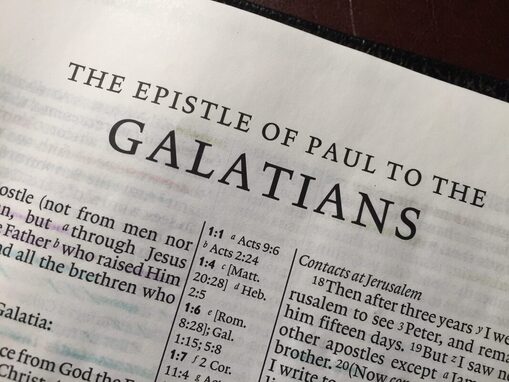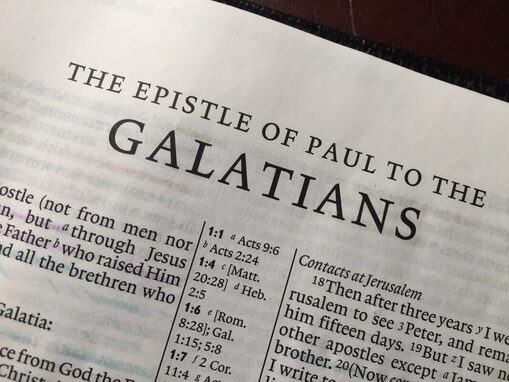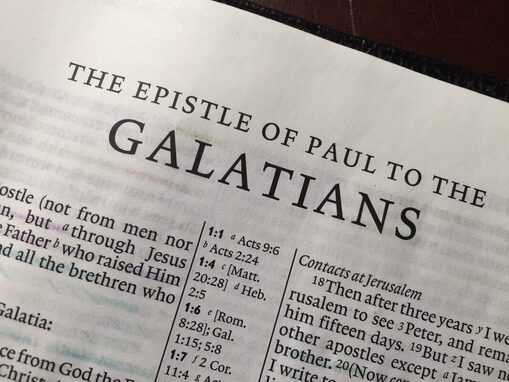In this session Paul defends the doctrine of salvation by grace and not works, The false teachers (Judizers) were teaching that salvation come only by belief in Jesus as Messiah PLUS obedience of the Mosaic Law. He also confront Peter accusing him of being a hypocrite.
To hear an audio recording of the session click the YouTube link at the end of the notes.
Galatians 2:1-10 NKJV Then after fourteen years I went up again to Jerusalem with Barnabas, and also took Titus with me. And I went up by revelation, and communicated to them that gospel which I preach among the Gentiles, but privately to those who were of reputation, lest by any means I might run, or had run, in vain. Yet not even Titus who was with me, being a Greek, was compelled to be circumcised. And this occurred because of false brethren secretly brought in (who came in by stealth to spy out our liberty which we have in Christ Jesus, that they might bring us into bondage), to whom we did not yield submission even for an hour, that the truth of the gospel might continue with you. But from those who seemed to be something—whatever they were, it makes no difference to me; God shows personal favoritism to no man—for those who seemed to be something added nothing to me. But on the contrary, when they saw that the gospel for the uncircumcised had been committed to me, as the gospel for the circumcised was to Peter (for He who worked effectively in Peter for the apostleship to the circumcised also worked effectively in me toward the Gentiles), and when James, Cephas, and John, who seemed to be pillars, perceived the grace that had been given to me, they gave me and Barnabas the right hand of fellowship, that we should go to the Gentiles and they to the circumcised. They desired only that we should remember the poor, the very thing which I also was eager to do.
2:1 Then after fourteen years I went up again to Jerusalem with Barnabas, and also took Titus with me. 2 And I went up by revelation, and communicated to them that gospel which I preach among the Gentiles, but privately to those who were of reputation, lest by any means I might run, or had run, in vain.
Remember from last week that three years after his conversion Paul went to Jerusalem to meet and visit with Peter, and also met James.
Galatians 1:17-19 NIV I did not go up to Jerusalem to see those who were apostles before I was, but I went into Arabia. Later I returned to Damascus. Then after three years, I went up to Jerusalem to get acquainted with Cephas and stayed with him fifteen days. I saw none of the other apostles—only James, the Lord’s brother.
The visit referred to in this verse is a second visit to Jerusalem, which probably was for the Jerusalem Council, called to resolve the issue of Gentile salvation. Remember what we have been saying about the reason that Paul wrote this letter. The Judizers and other false teachers were saying that you must obey the Mosaic law in order to receive salvation.
Acts 15:5-11 NIV Then some of the believers who belonged to the party of the Pharisees stood up and said, “The Gentiles must be circumcised and required to keep the law of Moses.” The apostles and elders met to consider this question. After much discussion, Peter got up and addressed them: “Brothers, you know that some time ago God made a choice among you that the Gentiles might hear from my lips the message of the gospel and believe. God, who knows the heart, showed that he accepted them by giving the Holy Spirit to them, just as he did to us. He did not discriminate between us and them, for he purified their hearts by faith. Now then, why do you try to test God by putting on the necks of Gentiles a yoke that neither we nor our ancestors have been able to bear? No! We believe it is through the grace of our Lord Jesus that we are saved, just as they are.”
At the end the Council sent a letter.
Acts 15:23-29 NIV With them they sent the following letter: The apostles and elders, your brothers, To the Gentile believers in Antioch, Syria and Cilicia: Greetings. We have heard that some went out from us without our authorization and disturbed you, troubling your minds by what they said. So we all agreed to choose some men and send them to you with our dear friends Barnabas and Paul— men who have risked their lives for the name of our Lord Jesus Christ. Therefore we are sending Judas and Silas to confirm by word of mouth what we are writing. It seemed good to the Holy Spirit and to us not to burden you with anything beyond the following requirements: You are to abstain from food sacrificed to idols, from blood, from the meat of strangled animals and from sexual im
morality. You will do well to avoid these things. Farewell.
Now back to our lesson for today. The revelation that Paul talks about is verse 2 a reference to what Paul knew as a divine commissioning of his visit in order to refute any suggestion by the Judaizers that they had sent Paul to Jerusalem to have the apostles correct his doctrine.
Paul hoped the Jerusalem leaders would support his ministry to the Gentiles. He did not want to see his ministry efforts wasted because of conflict with the other apostles.
3 Yet not even Titus who was with me, being a Greek, was compelled to be circumcised. 4 And this occurred because of false brethren secretly brought in (who came in by stealth to spy out our liberty which we have in Christ Jesus, that they might bring us into bondage), 5 to whom we did not yield submission even for an hour, that the truth of the gospel might continue with you.
At the core of the Judaizers’ works system was the Mosaic prescription of circumcision. They were teaching that there could be no salvation without circumcision.
Paul and the apostles denied that assertion, and as we read, it was settled at the Jerusalem Council. As a true believer, Titus was living proof that circumcision and the Mosaic regulations were not prerequisites or necessary components of salvation.
The apostles’ refusal to require Titus’s circumcision verified the church’s rejection of the Judaizers’ doctrine. The Judaizers were false brethren who pretended to be true Christians; yet their doctrine, because it claimed allegiance to Christ, was opposed to traditional Judaism, and, because it demanded circumcision and obedience to the Mosaic Law as prerequisites for salvation, was opposed to Christianity. The Judaizers were Satan’s undercover agents sent into the midst of the church to sabotage the true gospel.
The true gospel is that Christians are free from the law as a means of salvation, from its external ceremonial regulations as a way of living, and from its curse for disobedience to the law—a curse that Christ bore for all believers.
Galatians 3:13-14 NKJV Christ has redeemed us from the curse of the law, having become a curse for us (for it is written, “Cursed is everyone who hangs on a tree”), that the blessing of Abraham might come upon the Gentiles in Christ Jesus, that we might receive the promise of the Spirit through faith.
However, this freedom is not a license to sin and Paul says that later.
Galatians 5:13 NKJV For you, brethren, have been called to liberty; only do not use liberty as an opportunity for the flesh, but through love serve one another.
6 But from those who seemed to be something—whatever they were, it makes no difference to me; God shows personal favoritism to no man—for those who seemed to be something added nothing to me.
Paul is referring here to Peter, James, and John and saying that their apostleship is not more legitimate or authoritative than his because Christ commissioned them all. Paul never saw himself as apostolically inferior.
Romans 2:11 NKJV For there is no partiality with God.
7 But on the contrary, when they saw that the gospel for the uncircumcised had been committed to me, as the gospel for the circumcised was to Peter for the uncircumcised 8 (for He who worked effectively in Peter for the apostleship to the circumcised also worked effectively in me toward the Gentiles), 9 and when James, Cephas, and John, who seemed to be pillars, perceived the grace that had been given to me, they gave me and Barnabas the right hand of fellowship, that we should go to the Gentiles and they to the circumcised. 10 They desired only that we should remember the poor, the very thing which I also was eager to do.
Paul preached the gospel primarily to the Gentiles (also to Jews in Gentile lands, as his pattern was to go to the synagogue first.
Acts 13:4-5 NKJV So, being sent out by the Holy Spirit, they went down to Seleucia, and from there they sailed to Cyprus. And when they arrived in Salamis, they preached the word of God in the synagogues of the Jews. They also had John as their assistant.
Peter’s ministry was primarily to the Jews. But the same Holy Spirit worked in both of them. The Holy Spirit, who has but one gospel, empowered both Peter and Paul in their ministries.
So, with the right hand of fellowship, the pillars of the Christian church in Jerusalem, James, Peter, and John made what amounted to a solemn vow of friendship and mark of partnership. In the Near East a right hand of fellowship was their way of recognizing Paul as a teacher of the true gospel and a partner in ministry.
As they left they wanted to remind Paul and Barnabas to remember the poor. That was important because of about the financial plight of Jerusalem Christians.
The number of Christians in Jerusalem grew rapidly at first
and many who were visiting the city for the feast of Pentecost remained and never returned to their home.
Acts 2:1, 5, 41 NKJV When the Day of Pentecost had fully come, they were all with one accord in one place. And there were dwelling in Jerusalem Jews, devout men, from every nation under heaven. Then those who gladly received his word were baptized; and that day about three thousand souls were added to them.
While the believers initially shared their resources many had little money, and for years the Jerusalem church was economically pressed.
Acts 2:44-45 NKJV Now all who believed were together, and had all things in common, and sold their possessions and goods, and divided them among all, as anyone had need.
Acts 4:32-37 NKJV Now the multitude of those who believed were of one heart and one soul; neither did anyone say that any of the things he possessed was his own, but they had all things in common. And with great power the apostles gave witness to the resurrection of the Lord Jesus. And great grace was upon them all. Nor was there anyone among them who lacked; for all who were possessors of lands or houses sold them, and brought the proceeds of the things that were sold, and laid them at the apostles’ feet; and they distributed to each as anyone had need. And Joses, who was also named Barnabas by the apostles (which is translated Son of Encouragement), a Levite of the country of Cyprus, having land, sold it, and brought the money and laid it at the apostles’ feet.
Galatians 2:11-20 NKJV Now when Peter had come to Antioch, I withstood him to his face, because he was to be blamed; for before certain men came from James, he would eat with the Gentiles; but when they came, he withdrew and separated himself, fearing those who were of the circumcision. And the rest of the Jews also played the hypocrite with him, so that even Barnabas was carried away with their hypocrisy. But when I saw that they were not straightforward about the truth of the gospel, I said to Peter before them all, “If you, being a Jew, live in the manner of Gentiles and not as the Jews, why do you compel Gentiles to live as Jews? We who are Jews by nature, and not sinners of the Gentiles, knowing that a man is not justified by the works of the law but by faith in Jesus Christ, even we have believed in Christ Jesus, that we might be justified by faith in Christ and not by the works of the law; for by the works of the law no flesh shall be justified. “But if, while we seek to be justified by Christ, we ourselves also are found sinners, is Christ therefore a minister of sin? Certainly not! For if I build again those things which I destroyed, I make myself a transgressor. For I through the law died to the law that I might live to God. I have been crucified with Christ; it is no longer I who live, but Christ lives in me; and the life which I now live in the flesh I live by faith in the Son of God, who loved me and gave Himself for me.
Let’s look at the context of this section of the letter first.
Early Christianity had a distinctively Jewish flavor. The early church began almost exclusively with converts from Jewish backgrounds and personal histories steeped inHebrew traditions and practices. When large numbers of Gentiles also began embracingJesus Christ as Messiah, the result was a collision of very radically different cultural and religious worlds.
In and around this strange and new entity called the church rose a group determined to cling to the old legalism of the Mosaic Law. These were the Judaizers—devout God-fearing people claiming to follow Christ but teaching that Gentiles must be circumcised and adhere to the Mosaic Law. Not only did these Judaizers distort the gospel and confused the Gentile converts in Galatia, but they also called into question Paul’s apostolicclaims. In response, Paul wrote Galatians, a very stern and blunt letter about the good news of justification by faith.
In this section, Paul relates how he confronted Peter, the preeminent apostle, because of Peter’s failure to live up to the truth of the gospel. He was cool at first but when James and others, from the Jerusalem church, which was made up of mostly Jews, Peter had withdrawn from the Gentile believers to fellowship with the Judaizers, although they held a position he knew was wrong. Remember the Jerusalem Council. Peter apparently agreed with the decision of the Council but now in Antioch by now dissing the Gentiles
By doing so, Peter had in appearance supported their doctrine andhad nullified Paul’s divine teaching, especially the doctrine of salvation by grace alone through faith alone. Paul’s rebuke of Peter serves as one of the most dynamic statements in the New Testament on the absolute and unwavering necessity of the doctrine of justification by grace through faith.
Here are a couple of keys to this text. First is the doctrine of the Judaizers. They were devout, God-fearing, Jewish religious leaders who attempted to add to the gospel the legalistic requirements of the Old Testament, such as circumcision and obedience to the Sabbath laws. They must have recognized Jesus as the promised Messiah and even acknowledged the value of His sacrificial death on the cross—otherwise they would never have gotten a hearing in the church. They claimed to believe all the truths that other Christians believed. They did not purport to overtly deny the gospel but to improve it by adding the requirements, ceremonies, and standards of the old covenant to the New. This spirit of legalism was carried into the church by many Jews who had taken on the name of Christ.
The other key to the text is grace. The only gospel of God is the gospel of grace, which is the gospel of divine redemption totally apart from any work or merit of man.
Ephesians 2:8, 10 NKJV For by grace you have been saved through faith, and that not of yourselves; it is the gift of God, For we are His workmanship, created in Christ Jesus for good works, which God prepared beforehand that we should walk in them.
We live in grace from the moment of salvation, and if grace ever stopped, we would lose our undeserved salvation and perish in sin. The grace of Christ is God’s free and sovereign act of love and mercy in granting salvation through the death and resurrection of Jesus, apart from anything men are or can do, It is absurd to accept a gracious salvation and then endeavor to maintain righteousness through human efforts, ceremonies, and ritual.
Now let’s dig into the text;
Galatians 2:11-13 NKJV Now when Peter had come to Antioch, I withstood him to his face, because he was to be blamed; for before certain men came from James, he would eat with the Gentiles; but when they came, he withdrew and separated himself, fearing those who were of the circumcision. And the rest of the Jews also played the hypocrite with him, so that even Barnabas was carried away with their hypocrisy.
A better translation of “he was to be blamed” is “stood condemned”; Peter was guilty of sin by aligning himself with men he knew to be in error and because of the harm and confusion he caused the Gentiles.
Peter knew the decision the Jerusalem Council had made and he had been in Antioch for some time, eating with Gentiles. When Judaizers came, pretending to be sent by James, they lied, giving false claims of support from the apostles.
Peter had already given up all Mosaic ceremony read about Peter’s experience with the clean and unclean food and his visit to the home of Cornelius who was a Roman centurion and a Gentile. It’s in Acts 10:2-22.
To eat with the Judaizers and decline invitations to eat with the Gentiles, which he had previously done, meant that Peter was affirming the very dietary restrictions he knew God had abolished, and thus striking a blow at the gospel of grace.
Peter knew better
Acts 10:13-15 NKJV And a voice came to him, “Rise, Peter; kill and eat.” But Peter said, “Not so, Lord! For I have never eaten anything common or unclean.” And a voice spoke to him again the second time, “What God has cleansed you must not call common.”
The true motivation behind Peter’s defection was that he was afraid of losing popularity with the legalistic, Judaizing segment of people in the church, even though they were self-righteous hypocrites promoting a heretical doctrine.
This Greek word for hypocrite refers to an actor who would wear a mask to depict a mood or certain character. In the spiritual sense, it refers to someone who masks his true character by pretending to be something he is not—they were committed to the gospel of grace but were pretending to accept Jewish legalism.
Galatians 2:14-16 NKJV But when I saw that they were not straightforward about the truth of the gospel, I said to Peter before them all, “If you, being a Jew, live in the manner of Gentiles and not as the Jews, why do you compel Gentiles to live as Jews? We who are Jews by nature, and not sinners of the Gentiles, knowing that a man is not justified by the works of the law but by faith in Jesus Christ, even we have believed in Christ Jesus, that we might be justified by faith in Christ and not by the works of the law; for by the works of the law no flesh shall be justified.
By withdrawing from the Gentile Christians, Peter and the other Jewish believers were not walking in line with God’s Word.
Before his gradual withdrawal, Peter regularly had fellowship and ate with the Gentiles, thus modeling the ideal of Christian love and liberty between Jew and Gentile. But by his actions after the Jew came Peter was now declaring that their way was right.
We have to look at Paul’s statement in verse 15, “We who are Jews by nature, and not sinners of the Gentiles” in a legal sense. Gentiles were sinners by nature because they had no revealed, divine, written law to guide them toward salvation or living righteously.
Three times this verse declares that salvation is only through faith in Christ and not by law. The first is general, “a man is not justified”; the second is personal, “we might be justified”; and the third is universal, “no flesh shall be justified.”
The Greek word for justified describes a judge declaring an accused person not guilty and therefore innocent before the law. Throughout Scripture it refers toGod’s declaring a sinner not guilty and fully righteous before Him by imputing to him the divine righteousness of Christ and imputing the person’s sin to the sinless Savior for punishment.
Keeping the law is not a means of salvation because the root of sinfulnessis is the fallen nature of a person’s heart, not his or her actions. The law served as a mirror to reveal sin, not a cure for it.
Romans 7:7-9 NKJV What shall we say then? Is the law sin? Certainly not! On the contrary, I would not have known sin except through the law. For I would not have known covetousness unless the law had said, “You shall not covet.” But sin, taking opportunity by the commandment, produced in me all manner of evil desire. For apart from the law sin was dead. I was alive once without the law, but when the commandment came, sin revived and I died.
The cure;
Romans 7:24-25 NKJV O wretched man that I am! Who will deliver me from this body of death? I thank God—through Jesus Christ our Lord! So then, with the mind I myself serve the law of God, but with the flesh the law of sin.
Galatians 2:17-21 NKJV “But if, while we seek to be justified by Christ, we ourselves also are found sinners, is Christ therefore a minister of sin? Certainly not! For if I build again those things which I destroyed, I make myself a transgressor. For I through the law died to the law that I might live to God. I have been crucified with Christ; it is no longer I who live, but Christ lives in me; and the life which I now live in the flesh I live by faith in the Son of God, who loved me and gave Himself for me. I do not set aside the grace of God; for if righteousness comes through the law, then Christ died in vain.”
If the Judaizers’ doctrine was correct then Paul Peter Barnabas, and the other Jewish believers had fallen back into the category of sinners because they had been eating and fellowshiping with Gentiles , who, according to the Judaizers, were unclean.
If the Judaizers were right, then Christ was wrong and had been teaching people to sin because He taught that food could not contaminate a person.
Matthew 15:10-11 NKJVWhen He had called the multitude to Himself, He said to them, “Hear and understand: Not what goes into the mouth defiles a man; but what comes out of the mouth, this defiles a man.”
Paul’s air tight logic condemned Peter because by his actions he had, in effect, made it appear as if Christ were lying.
Paul said that if I preached that the false system of salvation through legalism was done away with and then I went back to salvation by works then I would be a transgressor or sinner. He had said that he died to the law through salvation.
When a person is convicted of a capital crime and executed, the law has no further claim on that person. So it is with the Christian who has died in Christ (who paid the penalty for his sins in full) and rises to new life in Him—justice has been satisfied and the believer is forever free from any further penalty.
A person who trusts in Christ for salvation spiritually participates with the Lord in His crucifixion and victory over sin and death. The believer’s old self is dead, having been crucified with Christ.
Romans 6:3-6 NKJV Or do you not know that as many of us as were baptized into Christ Jesus were baptized into His death? Therefore we were buried with Him through baptism into death, that just as Christ was raised from the dead by the glory of the Father, even so we also should walk in newness of life. For if we have been united together in the likeness of His death, certainly we also shall be in the likeness of His resurrection, knowing this, that our old man was crucified with Him, that the body of sin might be done away with, that we should no longer be slaves of sin.
The believer’s new person has the privilege of the indwelling Christ empowering him or her and living through him or her. The manifestation of Christ’s love for the believer through His sacrificial death on the cross. To now go back and say that you must obey the law in addition to faith is to say that those who insist that they can earn salvation by their own efforts undermine the foundation of Christianity and render unnecessary the death of Christ.
Truth For Today
The two pillars of the gospel are the grace of God and the death of Christ, and these are the two pillars that, by its veery nature, legalism destroys. The person who insists that he or she can earn salvation by his own efforts undermines the very foundation of Christianity and nullifies the precious death of Christ on his or her behalf.








 RSS Feed
RSS Feed